January 2020: Olive Tree

Volume IV/Issue 10/January 2020


From The Editorial Desk
2020 New Year Resolutions or a Revelation?
Psalms 1:1-3
1 Blessed is the man that walketh not in the counsel of the ungodly, nor standeth in the way of sinners, nor sitteth in the seat of the scornful.
2 But his delight is in the law of the LORD; and in his law doth he meditate day and night.
3 And he shall be like a tree planted by the rivers of water, that bringeth forth his fruit in his season; his leaf also shall not wither; and whatsoever he doeth shall prosper.
Once again God has allowed us to see a new year. And it's not because we have been so good, but it's because God has been so good.
New Years is a time where people all over the world are making new years resolutions. We hear about resolutions every new year ranging from spending more time with family to the quitting of bad habits. Habits that we should have stopped years ago. And the end results of many of our resolutions is failure...time and time again.
But the reason why our resolutions often fail, is because resolutions are self imposed. Self willed and self motivated ideas that do not include the power of God!
What you really need is not another New Year resolution, but a New Year revelation. Because if the truth be told, the best revelations comes from God through His Church and through the Scriptures. A revelation contains Gods plan and purpose for your life.
In Psalms 1, the Psalmist provides us with a Spirit filled revelation that will guide us into 2020.
Notice how he starts the revelation by saying BLESSED. The Psalmist reveals to us that to be blessed, is something we must do for ourselves. By watching the company that we keep in 2020. He is saying, if you want to be blessed in 2020, you have to terminate some people in your circle of friends and delete some contacts in your cell phone. Because in the text he mentions three group of people:
1-THE UNGODLY
2-THE SINNER
3. THE PESTILENCE
The ungodly are those who sin knowingly and feel no conviction. The sinner are those who sin openly and the pestilence are those who sin and encourage others to join them. And so what the Psalmist is telling us is, if you hang around wolves, you will start howling like a wolf. That's why Saint Paul tells us in his second letter to the Corinthians:
Wherefore, Go out from among them, and be ye separate, saith the Lord, and touch not the unclean thing. (2 Corinthians 6:17)
In other words, blessed is the man or woman not walking- not standing- not sitting with people who, in the words of the old southern preacher, “DON`T MEAN US NO GOOD”!
The text also reveals to us that we have to saturate ourselves in the divine principles given to the Church through the Word of God. In other words we have to get a Bible and read it and believe it.
Lets go a step farther. If you really want to see God move in a mighty way in 2020, we have to get a Bible and read it-believe it, and pray and meditate over it.
But even more then that, if you really want to live the way God wants you to live in 2020, you need to get a bible-read it-believe it-pray and meditate on it-and apply it to your everyday lives. Because the blessed man, the blessed woman is compared to a tree. And not just any tree, but a tree that has been intentionally planted in a carefully chosen spot. Positioned to receive plenty of water for growth where it can become fruitful and when your planted in the scriptures.
The winds and storms of life may still blow your way, but because you are planted and rooted in the Word of God you have an anchor and His name is Jesus Christ.
You see, God has placed your life in His care. And when you stay planted and positioned in the word of God, Nothing can stop halt or hinder the process of what God is going to do in your life in 2020.
So stay planted. Remain positioned. In this way you will be productive on the battlefield for the Lord in 2020.
Citizens of Heaven
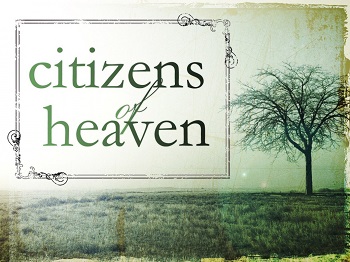
"But our conversation is in heaven; from whence also we look for the Saviour, our Lord Jesus Christ," [Philippians 3:20]In last month's Olive Tree we were reminded by Saint John Cassian that we are citizens of heaven. Let us take this to heart and consider it well. Saint John referred us to the above verse, "But our conversation is in heaven;" What conversation would we hear in heaven? As citizens of heaven, we must live a heavenly life style. And this lifestyle is outlined for us in the Sacred Scriptures, which should be our constant companion. Not only should we read the Sacred Scriptures, we should meditate on what they say.
How do we purify our conversation, so that it is truly heavenly? In the computer world there is an old saying, "garbage in, garbage out." Put another way, we are what we think and bring into our mind, which eventually seeps into our hearts. Saint Paul tells Timothy (I Timothy 4:7): "But avoid foolish and old wives' fables: and exercise thyself unto godliness." We need to avoid foolishness and useless things.
Look at what you read, watch on a machine, such as TV, computer, etc. Is any of this conversation heavenly? Is it at best useless? Or what is worse, is it downright evil? How much time is devoted to these things. Then let us consider how much time we spend in the spirit, that is in spiritual things, whether this be prayer, reading the Scriptures, reading the Saints, considering spiritual things in our heart.
What we need to do here is make sure our priorities are straight. A good citizen has his priorities straight and is a blessing not only to himself and his household, but also to his neighbors and his country. Heaven is our true home, and we are exiles here on earth. And yet, how many of us heap up possessions; possessions which are destroying our souls and preparing us for a trip the wrong direction? Let us be honest with ourselves, and consider this well. If we live as if earth is our true home, we will find that the next life will be spent in eternal misery in hell. However, if we live as exiles here on earth, preparing to go home to heaven, we shall surely find our way there.
The Importance of the Feast of the Circumcision of Our Lord
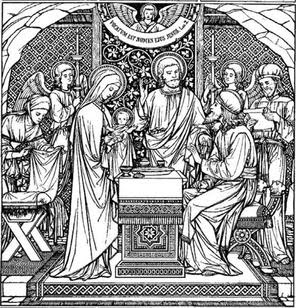
The end of every year seems to bring confusion enough with the various holidays which we celebrate at that time . . . . Thanksgiving . . . . Christmas . . . New Years. One holiday seems to blur into the next holiday. Since the secular world has hijacked Christmas and turned it into one big marketing scheme, the world is more concerned with all the fancy gifts we exchange on Christmas with our loved ones. But on January 1st, liturgically speaking, depending on what church you are in or what jurisdiction your church is in, you may see any number of feasts celebrated and commemorated. The new calendar of the churches celebrate on January 1st, "Mary, the Mother of God." In other more traditional churches, such as Anglican and traditional Catholic churches, they still celebrate the "Feast of the Circumcision of Our Lord." At one time this feast was once a major feast on the Church calendar. While it is important to celebrate a feast in honour of Our Lady, it is regrettable that the "Feast of the Circumcision of Our Lord" should be ignored or removed altogether when there is so much to learn from this lesson in the early life of the Child Jesus.
We read in St. Luke 2:21: “And after eight days were accomplished, that the child should be circumcised, his name was called Jesus, which was called by the angel before he was conceived in the womb.”
The importance of this feast, as highlighted in this verse coming from St. Luke, could be summed up in the following ways:
1) Jesus felt pain / His Blood was spilled. 2) Jesus, as a human being, was obedient to the Law. 3) The Name of Jesus, a holy name, is connected to this feast.
1) Jesus Felt Pain / His Blood was spilled.
It cannot be emphasized enough that Our Blessed Saviour came into the world to save us from our sins. In order to do this He freely carried His Cross to the hill at Calvary and died upon the Cross. He did this not to atone for His own sins . . . . Because He had no sins . . . . . He did it to atone for our sins, yours and mine. His Precious Blood was spilt along the way: when He was scourged at the pillar; when He was compelled to carry His Cross; when He was nailed to the Cross. But despite all of this, it must be noted that He did all of this freely. Why do I emphasize this point? I emphasize it because Our Blessed Lord shed His Blood freely out of the love that He has for you and for me. He did it not for His own sake for our sake. And in the Circumcision it foreshadows, if you will, the Blood Our Blessed Lord chose to shed on Calvary. Our Lord chose to die for us . . . He chose to shed His Blood for us . . . He chose to experience pain on our behalf. There was no need to do any of these things for His own benefit. He did these things solely for our benefit. Thus, when the Infant Jesus suffered pain when He was circumcised on the eighth day after His birth, it is a foreshadowing of the pain He freely chose to endure out of love for us.
2) Jesus was obedient to the Law
In Genesis 17:10-12 we hear the following: "This is my covenant which you shall observe between me and you, and thy seed after thee: All the male-kind of you shall be circumcised. And you shall circumcise the flesh of your foreskin, that it may be for a sign of the covenant between me and you. An infant of eight days old shall be circumcised among you, every man-child in your generations: he that is born in the house, as well as the bought servant, shall be circumcised."
Thus, on the Eighth Day after His Birth, the Child Jesus was brought by Our Lady and St. Joseph to be circumcised. In so doing, Christ first fulfilled the Mosaic Law by His circumcision. Later, He would also fulfill the Law once again by being baptized by St. John the Baptist. In so doing, Our Lord shows that He never expects us to do anything that He Himself is not willing to do. Our Lord was faithful. He was obedient. In other words, Our Lord lets His actions speak for Him. He does not just tell us to be obedient, He shows us through His own example how to be obedient. And Our Lady and St. Joseph themselves showed obedience to God by the fulfilling of the circumcision on the eighth day.
3) The Holy Name of Jesus
As St. Luke informed us earlier when he wrote: "“And after eight days were accomplished, that the child should be circumcised, his name was called Jesus, . . . ." Thus, the Holy Name of Jesus closely connected to the Circumcision of the Divine Child Jesus. It is little wonder that both the Name of Jesus and the Precious Blood mean so much to humanity.
"Therefore God has highly exalted him and bestowed on him the name that is above every name, so that at the name of Jesus every knee should bow, in heaven and on earth and under the earth, and every tongue confess that Jesus Christ is Lord, to the glory of God the Father." (Philippians 2:9-11)
In the day and age in which we live, we must do our best to always keep holy the Precious Name of Jesus. Similar to how the world has hijacked the true meaning of Christmas, so too has the world taken the Holy Name of Jesus and people now hold this Precious Name in such utter disregard. At one time, pious Christians the world over would keep Our Lord's Name is such high regard that they would bow their head whenever they heard this Precious and Holy Name. Unfortunately, today we hear the Lord's Name mentioned constantly but not in a reverent fashion. On the contrary, we hear people blaspheming the Name of the Lord and not giving it a second thought. Without a doubt, the devil has worked overtime, I am sure, to convince the world that this Name is not important. Nothing could be further from the truth. It is a Name that is certainly above every other name just like it is the Precious Blood of Christ which saves us from our sins. We do Our Lord a disservice when we do not show reverence at His Name.
The Funny Pharmacy
A joyful mind maketh age flourishing: a sorrowful spirit drieth up the bones. - Proverbs 17:22







Is it your opinion that if a priest once celebrated the Novus Ordo then he was forever heretical?
I hold that the celebration of the Novus Ordo Missae is an act of heresy, because of the problems noted by Cardinals Ottaviani and Bacci, as well as the invalid form of consecration of the wine used in the vernacular in most languages until a few years ago. (They translated pro multis as for all, which is a false invalidating translation.) A priest can renounce his heresy, but may not function as a priest until reconciled by the Pope.

The Pope Speaks: January 2020
Traditionalism Is Not About the Mass

"Therefore, brethren, stand fast; and hold the traditions which you have learned, whether by word, or by our epistle." (II Thessalonians 2:14) It is most likely that those who decided originally to call themselves Traditionalists in the 1960's were referring to this verse in Sacred Scripture. This chapter of Sacred Scripture discusses the Antichrist, who many of us thought in the 1960's and 1970's might be coming soon.
The Second Ecumenical Council of the Vatican known commonly as Vatican 2 (1962-1965) called by Angelo Roncalli as the second Antipope John XXIII in history and carried on by his successor, Paul 6, had a logical reaction. Ironically the first John XXIII also called a Council, the Council of Constance. After this Council deposed him and Pope Gregory XII resigned in favor of a new election at the end of the Council, this Council healed the Western Schism. Vatican 2, however would usher in the Great Apostasy.
Joseph Ratzinger would speak about the Bishops arriving in Vatican 2 in his book, Milestones: "For believers, it was a remarkable phenomenon that their bishops seemed to show a different face in Rome from the one they wore at home. Shepherds who had been considered strict conservatives suddenly appeared to be spokesmen for progressivism." (page 132) Basically these wolves in sheep's clothing realized when they got to Vatican 2 that the cat was away, so the mice decided to play, and play they did.
Back home the preachers in the pulpits soon found that it was open season. Of course the sermons began to vary from parish to parish, as one preacher might be very conservative, while the preacher in the next parish was very liberal in his thinking. The sermons became so offensive to pious ears, that one old couple was no longer able to hear the sermons. Their Catholic mind simply turned off their ears at the time of the sermon. Another person observed that some sermons would begin fine and being knowledgeable in the Faith she would know where it should go. However, half way through the preacher would take a left turn and end up some place totally different. Some people walked out of the sermon, because it was so heretical. In fact one man stood up and looked down the pew, which was filled with his children with his wife at the other end, and said their family name and then "out". And proceeded to process his family down the center aisle and out.
We thank God that concerned parents in Oklahoma City in about 1965 formed a catechism class to teach the Catholic Faith to us. Recently We were interviewed for a school project by some college students. They asked: "When did you realize your views were different from the mainstream catholic church?" We were enrolled in this catechism class mid way through third grade. In the late 1960's We began fifth grade in Rosary School. Although the pastor at the time was very conservative as was his assistant, the nuns teaching were very liberal. They emphasized the Social Gospel. After a few catechism classes, We began to think these classes were a joke and a waste of time. We never heard of the Creed, the Commandments or the Sacraments in these classes. We were there for four years, fifth through eighth grade.
Although I was still a child, our concern was the Faith. I recall that my Dad told the first Traditional priest to bring the Mass throughout the United States, Father James Dunphy, that he had converted in 1968. This priest asked: "how?"
Isn't it the Mass that matters? Martin Luther was the first to say that it is the Mass that matters. The earliest references to Tolle Missam: Tolle Ecclesiam (Destroy the Mass and destroy the Church) attribute the saying to Martin Luther as well. Luther, and Cranmer both revised the Mass and Sacraments to fit their new theology. Note well the heretical theology came before the destruction of the Mass. Henry VIII was buried with the same Mass that was in use the day he was born, the Sarum Usage of the Latin Rite. It was after his death that his successors and the clergy went seriously into heresy. Prior to that it had been a schism only. Of course, every schism invents a heresy to support itself.
Let us return to the 1960's and the catechism class I attended. Dad was not even a Catholic, so he either stayed home with my baby brother or came with us and stayed with my brother at his in-laws two and a half blocks from the Cathedral where the classes were held on Sunday mornings. Mom and I would go to Mass at the cathedral rather than our parish church, because it was convenient. After his conversion Dad came with us to Mass and attended the high school classes.
The Novus Ordo Missae was promulgated on April 3, 1969. However, it took time to translate it into the various vernaculars. In English the International Commission for English in the Liturgy translated the Roman Canon of the John XXIII Mass into English, translating the Latin words pro multis into for all. When the Novus Ordo was instituted this mis-translation continued. However, no one we knew noticed this problem. It was only later that we would look back and find out that the Mass had not been valid since this mis-translation came into use on October 22, 1967 in the United States.
Although the Mass is extremely important, it is the Faith that matters, a faith based upon Sacred Scripture and Tradition. Jesus said: "Not in bread alone doth man live, but in every word that proceedeth from the mouth of God." (Matthew 4:4) Jesus also said: "And it came to pass, as he spoke these things, a certain woman from the crowd, lifting up her voice, said to him: Blessed is the womb that bore thee, and the paps that gave thee suck. But he said: Yea rather, blessed are they who hear the word of God, and keep it." (Luke 11:27-28) Commenting on this Saint John Vianney tells us that heading the word of God is more important than receiving the Holy Eucharist: "Perhaps it seems to you, my brethren, that Jesus Christ teaches us that he who hears the word of God with the earnest wish to profit by it, is more pelasing to God than he who receives Him in Holy Communion." The reason is simple, without hearing the Word of God, we cannot understand how truly precious the Holy Eucharist is.
Unfortunately Traditionalism has gone off course, focusing on minor points of practice, while the Faith has been taken away from them. Much time is wasted debating which Mass to use, John XXIII-II or Tridentine, as they are slightly different. Time is wasted discussing which calendar to use, that of Pope Saint Pius X, the 1955 revision by Pope Pius XII, or the 1960 of John XXIII-II. Should we use the Holy Week prior to 1955 or the new one instituted at the request of the Bishops for good pastoral reasons by Pope Pius XII in 1955. All the while little time is spent in what is truly important, the Word of God.
There were two incidents that caused this shift. The first was the fact that some began looking to Vatican 2 to see if it was the source. They would find troubling statements in Vatican 2 and bring them to light. Rather than address the issue, we were told that the book in circulation was not an official translation. Remember this was the 1960's, and information was not readily available. In any case, instead of addressing the real issues, people were diverted away from looking at Vatican 2 as the source of the problem.
The second was the introduction of the Novus Ordo and the logical reaction by priests and people to leave the pews and seek a place for the true Mass and Faith. Soon, the focus was shifted to the Mass away from the cause of the New Mass, the destruction of the Faith. This all occurred in the early 1970's, when priests and even an archbishop shifted away from the Novus Ordo to return to the Tridentine Mass. A few priests refused the Novus Ordo from the beginning. However, many of the popular Traditionalist priests of the late 1970's celebrated the Novus Ordo for a time. In fact, Archbishop Lefebvre founded the Apostles of Jesus and Mary under its public title the Society of Saint Pius X (SSPX) on the Novus Ordo. It was only when a professor there challenged him on this, that he dumped the innovated mass of Paul VI in favor the the Tridentine Mass. Later he would dump the Tridentine Mass in favor the 1962 Missal of John XXIII, which is quite similar, but different on a few points. https://www.traditioninaction.org/Questions/B409_Lefebvre.html
One might be surprised to know that in the early 1970's that Traditionalists were also sede vacantists at heart. How can a true Pope give us the heresies that are flowing from the Conciliar Church? The actual debate on this did not really begin until the very late 1970's.
It is not the Mass that matters, but the Faith. Restore the Faith completely, and the Mass and Sacraments will be preserved. Unfortunately, modern Traditionalism lost this focus decades ago, focusing on the Mass and not the Faith.


Saint John Cassian
On The Eight Vices
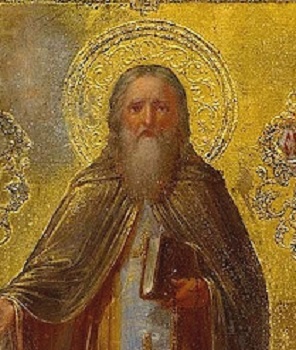
On Avarice
Our third struggle is against the demon of avarice, a demon clearly foreign to our nature, who only gains entry into a monk because he is lacking in faith. The other passions, such as anger and desire, seem to be occasioned by the body and in some sense implanted in us at birth. Hence they are conquered only after a long time. The sickness of avarice, on the contrary, can with diligence and attention be cut off more readily, because it enters from outside. If neglected, however, it becomes even harder to get rid of and more destructive than the other passions, for according to the Apostle it is 'the root of all evil' (1 Tim. 6:10).
Avarice is a passion deriving not from our nature, but solely from an evil and perverted use of our free will. When this sickness finds the soul lukewarm and lacking in faith at the start of the ascetic path, it suggests to us various apparently justifiable and sensible reasons for keeping back something of what we possess. It conjures up in a monk's mind a picture of a lengthy old age and bodily illness; and it persuades him that the necessities of life provided by the monastery are insufficient to sustain a healthy man, much less an ill one; that in the monastery the sick, instead of receiving proper attention, are hardly cared for at all; and that unless he has some money tucked away, he will die a miserable death. Finally, it convinces him that he will not be able to remain long in the monastery because of the load of his work and the strictness of the abbot. When with thoughts like these it has seduced his mind with the idea of concealing any sum, however trifling, it persuades him to learn, unknown to the abbot, some handicraft through which he can increase his cherished hoardings. Then it deceives the wretched monk with secret expectations, making him imagine what he will earn from his handicraft, and the comfort and security which will result from it.
Now completely given over to the thought of gain, he notices none of the evil passions which attack him: his raging fury when he happens to sustain a loss, his gloom and dejection when he falls short of the gain he hoped for. Just as for other people the belly is a god, so for him is money. That is why the Apostle, knowing this, calls avarice not only 'the root of all evil' but 'idolatry' as well (Col. 3:5).
How is it that this sickness can so pervert a man that he ends up as an idolater? It is because he now fixes his intellect on the love, not of God, but of the images of men stamped on gold. A monk darkened by such thoughts and launched on the downward path can no longer be obedient. He is irritable and resentful, and grumbles about every task. He answers back and, having lost his sense of respect, behaves like a stubborn, uncontrollable horse. He is not satisfied with the day's ration of food and complains that he cannot put up with such conditions for ever. Neither God's presence, he says, nor the possibility of his own salvation is confined to the monastery; and, he concludes, he will perish if he does not leave it. He is so excited and encouraged in these perverse thoughts by his secret hoardings that he even plans to quit the monastery. Then he replies proudly and harshly no matter what he is told to do, and pays no heed if he sees something in the monastery that needs to be set right, considering himself a stranger and outsider and finding fault with all that takes place. Then he seeks excuses for being angry or injured, so that he will not appear to be leaving the monastery frivolously and without cause. He does not even shrink from trying through gossip and idle talk to seduce someone else into leaving with him, wishing to have an accomplice in his sinful action.
Because the avaricious monk is so fired with desire for private wealth he will never be able to live at peace in a monastery or under a rule. When like a wolf the demon has snatched him from the fold and separated him from the flock, he makes ready to devour him; he sets-him to work day and night in his cell on the very tasks which he complained of doing at fixed times in the monastery. But the demon does not allow him to keep the regular prayers or norms of fasting or orders of vigil. Having bound him fast in the madness of avarice, he persuades him to devote all his effort to his handicraft.
There are three forms of this sickness, all of which are equally condemned by the Holy Scriptures and the teaching of the Fathers. The first induces those who were poor to acquire and save the goods they lacked in the world. The second compels those who have renounced worldly goods by offering them to God, to have regrets and to seek after them again. A third infects a monk from the start with lack of faith and ardor, so preventing his complete detachment from worldly things, producing in him a fear of poverty and distrust in God's providence and leading him to break the promises he made when he renounced the world.
Examples of these three forms of avarice are, as I have said, condemned in Holy Scripture. Gehazi wanted to acquire property which he did not previously possess, and therefore never received the prophetic grace which his teacher had wished to leave him in the place of an inheritance. Because of the prophet's curse he inherited incurable leprosy instead of a blessing (cf. 2 Kgs. 5:27). And Judas, who wished to acquire money which he had previously abandoned on following Christ, not only lapsed so far as to betray the Master and lose his place in the circle of the apostles; he also put an end to his life in the flesh through a violent death (cf. Matt. 27:5). Thirdly, Ananias and Sapphira were condemned to death by the Apostle's word when they kept back something of what they had acquired (cf. Acts 5:1-10). Again, in Deuteronomy Moses is indirectly exhorting those who promise to renounce the world, and who then retain their earthly possessions because of the fear that comes from lack of faith, when he says: 'What man is there that is fearful and faint-hearted? He shall not go out to do battle; let him return to his house, lest his brethren's heart faint as well as his heart' (cf. Deut. 20:8). Could anything be clearer or more certain than this testimony? Should not we who have left the world learn from these examples to renounce it completely and in this state go forth to do battle? We should not turn others from the perfection taught in the Gospels and make them cowardly because of our own hesitant and feeble start.
Some, impelled by their own deceit and avarice, distort the meaning of the scriptural statement, 'It is more blessed to give than to receive' (Acts 20:35). They do the same with the Lord's words when He says, 'If you want to be perfect, go and sell all you have and give to the poor, and you will have treasure in heaven; and come and follow Me' (Matt. 19:21). They judge that it is more blessed to have control over one's personal wealth, and to give from this to those in need, than to possess nothing at all. They should know, however, that they have not yet renounced the world or achieved monastic perfection so long as they are ashamed to accept for Christ's sake the poverty of the Apostle and to provide for themselves and the needy through the labor of their hands (cf. Acts 20:34); for only in this way will they fulfill the monastic profession and be glorified with the Apostle. Having distributed their former wealth, let them fight the good fight with Paul 'in hunger and thirst . . . in cold and nakedness' (2 Cor. 11:27). Had the Apostle thought that the possession of one's former wealth was more necessary for perfection, he would not have despised his official status as a Roman citizen (cf. Acts 22:25). Nor would those in Jerusalem have sold their houses and fields and given the money they got from them to the apostles (cf. Acts 4: 34-35), had they felt that the apostles considered it more blessed to live off one's own possessions than from one's labor and the offerings of the Gentiles.
The Apostle gives us a clear lesson in this matter when he writes to the Romans in the passage beginning, 'But now I go to Jerusalem to minister to the saints', and ending: 'They were pleased to do it, and indeed they are in debt to them' (Rom. 15:25-27). He himself was often in chains, in prison or on fatiguing travel, and so was usually prevented from providing for himself with his own hands. He tells us that he accepted the necessities of life from the brethren who came to him from Macedonia (cf. 2 Cor. 11:9); and writing to the Philippians he says: 'Now you Philippians know also that . . . when I departed from Macedonia no church except you helped me with gifts of money. For even in Thessalonica you sent me help, not once but twice' (Phil. 4:15-16). Are, then, the avaricious right and are these men more blessed than the Apostle himself, because they satisfied his wants from their own resources? Surely no one would be so foolish as to say this.
If we want to follow the gospel commandment and the practice of the whole Church as it was founded initially upon the apostles, we should not follow our own notions or give wrong meanings to things rightly said. We must discard faint-hearted, faithless opinion and recover the strictness of the Gospel; In this way we shall be able to follow also in the footsteps of the Fathers, adhering to the discipline of the cenobitic life and truly renouncing this world.
It is good here to recall the words of St Basil, Bishop of Caesarea in Cappadocia. He is reported once to have said to a senator, who had renounced the world in a half-hearted manner and was keeping back some of his personal fortune: 'You have lost the senator and failed to make a monk.' We should therefore make every effort to cut out from our souls this root of all evils, avarice, in the certain knowledge that if the root remains the branches will sprout freely.
This uprooting is difficult to achieve unless we are living in a monastery, for in a monastery we cease to worry about even our most basic needs. With the fate of Ananias and Sapphira in mind, we should shudder at the thought of keeping to ourselves anything of our former possessions. Similarly, frightened by the example of Gehazi who was afflicted with incurable leprosy because of his avarice, let us guard against piling up money which we did not have while in the world. Finally, recalling Judas' death by hanging, let us beware of acquiring again any of the things which we have already renounced. In all this we should remember how uncertain is the hour of our death, so that our Lord does not come unexpectedly and, finding our conscience soiled with avarice, say to us what God says to the rich man in the Gospel: 'You fool, this night your soul will be required of you: who then will be the owner of what you have stored up?' (Luke 12: 20).

Saints from East and West
Saints whose feasts are celebrated this month
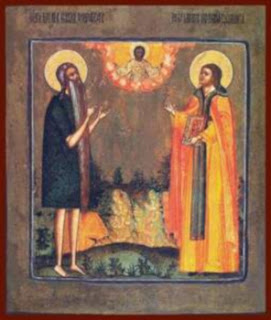
January 15 (Byzantine) - Saints Paul of Thebes and John the Hut-Dweller
The Monk Paul of Thebes was born in Egypt, in the Thebaid city. Left orphaned, he suffered many things from a greedy kinsman over a parental inheritance. During the time of the persecution against Christians under the emperor Decius (249-251), Saint Paul learned of the insidious plan to deliver him into the hands of the persecutors, and so he fled the city and set out into the wilderness.
Settling into a cave at the bottom of a hill, and known there to no one, the Monk Paul dwelt in it for 91 years, praying incessantly to God both day and night. He sustained himself on dates and bread, which a raven brought him, and he sheltered himself from cold and frost with a garb made of palm leaves. Through the foresight of God, shortly before the end of the Monk Paul, the Lord revealed about him to the Monk Anthony the Great, who also asceticised in the Thebaid wilderness. One time a thought came to Saint Anthony, that scarcely was there another so great a wilderness dweller as he, and then he heard a voice: "Anthony, there is a servant of God more accomplished than thee, and he hath settled here in this wilderness before thee. Go further into the remote area and there find him." Anthony went and came to the cave of Saint Paul. A lesson in humility having been taught Anthony, the Monk Paul came out towards him. The elders greeted each other by name, and having hugged they entered into lengthy discussion. During the time of the conversation the raven flew by and brought them both bread. The Monk Paul disclosed to Saint Anthony that his end time was approaching and gave him instruction to bury him. The Monk Paul then expired during the time of prayer, upright on his knees. The Monk Anthony then beheld how his soul, amidst Angels and prophets and apostles, ascended up to God. Two lions ran out from the wilderness and with their claws dug out the grave. The Monk Anthony buried the holy elder, and having taken his garb of palm leaves, he set out to his own monastery. The Monk Anthony kept this garb as a great holy reminder and put it out only twice a year - on Pascha and Pentecost. The Monk Paul of Thebes died in the year 341, when he was 113 years old. He did not establish a single monastery, but soon after his end there appeared many imitators of his life and they filled the wilderness with monasteries. The Monk Paul is considered among the fathers of monasticism.
In the twelfth century, the body of Saint Paul, on orders of the emperor Manuel (1143-1180), was transferred to Constantinople and placed in the Peribleptoi monastery of the Mother of God. Afterwards it was taken to Venice, and finally to Hungary, at Ofa. Part of his head is situated in Rome.
The Monk John the Hut-Dweller was the son of rich and illustrious parents living in Constantinople during the fifth century, and he received a fine education. He loved to read spiritual books, and having perceived the vanity of secular life, he preferred "rather than the broad path one that was narrow and infirm and extremely rigorous." Having persuaded his parents to give him a Gospel, he set out secretly to Bithynia. At the monastery "Unceasing Vigilance" he received monastic tonsure. The young monk began to asceticise with zeal, astonishing his brethren with unceasing prayer, humble obedience, strict abstinence and perseverance at work.
After six years he began to undergo temptations: thoughts about his parents, about their love and fondness, about their sorrow - all this began to overtake the young ascetic.
Saint John disclosed his situation to the hegumen and he asked to be released from the monastery, and he besought the brethren not to forget him in their prayers, hoping that by their prayers he would with the help of God, both see his parents and overcome the snares of the devil. The hegumen gave him his blessing.
Saint John returned to Constantinople in the clothes of a beggar, and known to no one. He settled at the gates of his parental home. The parents sent him food from their table, for the sake of Christ. For three years, oppressed and insulted, he lived in a tent (hut), enduring cold and frost, unceasingly conversing with the Lord and the holy Angels. Always with him was the Gospel, given him by his parents, and from which he unceasingly gathered out sayings of life eternal. Before his death the Lord appeared in a vision to the monk, revealing that the end of his sorrows was approaching and that after three days he would be taken up into the Heavenly Kingdom.
Only then did the saint show his parents the Gospel, which they had given him shortly before he had left his parental home. The parents recognised their son. With tears of joy they hugged him simultaneously with tears of sorrow, in that he had endured privation for so long at the very gates of his parental home. Saint John gave final instructions to his parents to bury him on the spot where stood his tent, and to put in the grave the beggar's rags that he wore during life.
The saint died in the mid fifth century, when he was not yet 25 years of age. On the place of his burial the parents built a church to God and alongside it a house of hospitality for strangers. In the twelfth century the head of the saint was taken by Crusaders to Besacon (in France), and the other relics of the saint were taken to Rome.

January 21 - Saint Agnes
Saint Agnes has always been looked upon in the Church as a special patroness of bodily purity. She is one of the most popular of Christian saints, and her name is commemorated every day in the canon of the Mass. Rome was the scene of her triumph, and Prudentius says that her tomb was shown within sight of that city. She suffered perhaps not long after the beginning of the persecution of Diocletian, whose cruel edicts were published in March in the year 303. We learn from St Ambrose and St Augustine that she was only thirteen years of age at the time of her glorious death. Her riches and beauty excited the young noblemen of the first families in Rome to contend as rivals for her hand. Agnes answered them all that she had consecrated her virginity to a heavenly husband, who could not be beheld by mortal eyes. Her suitors, finding her resolution unshakable, accused her to the governor as a Christian, not doubting that threats and torments would prove more effective with one of her tender years on whom allurements could make no impression. The judge at first employed the mildest expressions and most seductive promises, to which Agnes paid no regard, repeating always that she could have no other spouse but Jesus Christ. He then made use of threats, but found her endowed with a masculine courage, and even eager to suffer torment and death. At last terrible fires were made, and iron hooks, racks and other instruments of torture displayed before her, with threats of immediate execution. The heroic child surveyed them undismayed, and made good cheer in the presence of the fierce and cruel executioners. She was so far from betraying the least symptom of terror that she even expressed her joy at the sight, and offered herself to the rack. She was then dragged before the idols and commanded to offer incense, but could, St Ambrose tells us, by no means be compelled to move her hand, except to make the sign of the cross.
The governor, seeing his measures ineffectual, said he would send her to a house of prostitution, where what she prized so highly should be exposed to the insults of the brutal and licentious youth of Rome. Agnes answered that Jesus Christ was too jealous of the purity of His chosen ones to suffer it to be violated in such a manner, for He was their defender and protector. "You may," said she, "stain your sword with my blood, but you will never be able to profane my body, consecrated to Christ." The governor was so incensed at this that he ordered her to be immediately led to the place of shame with liberty to all to abuse her person at pleasure. Many young profligates ran thither, full of wicked desires, but were seized with such awe at the sight of the saint that they durst not approach her; one only excepted, who, attempting to be rude to her, was that very instant, by a flash, as it were of lightning from Heaven, struck blind, and fell trembling to the ground. His companions, terrified, took him up and carried him to Agnes, who was singing hymns of praise to Christ, her protector. The virgin by prayer restored his sight and his health.
The chief accuser of the saint, who had at first sought to gratify his lust and avarice, now, in a spirit of vindictiveness, incited the judge against her, his passionate fondness being changed into fury. The governor needed no encouragement, for he was highly exasperated to see himself set at defiance by one of her tender age and sex. Being resolved therefore upon her death, he condemned her to be beheaded. Agnes, filled with joy on hearing this sentence, "went to the place of execution more cheerfully," says St Ambrose, "than others go to their wedding." The executioner had instructions to use all means to induce her to give way, but Agnes remained constant; and having made a short prayer, bowed down her neck to receive the death stroke. The spectators shed tears to see this beautiful child loaded with fetters, and offering herself fearlessly to the sword of the executioner, who with trembling hand cut off her head at one stroke. Her body was buried at a short distance from Rome, beside the Nomentan road.


Books to feed your faith!
Instructions For Preachers: Getting Your Message From the Pulpit to the Pew
$9.95
Saint Alphonsus Marie de Ligouri presents the proper method of preaching, that will move hearts to repentance and encourage people to live a virtuous way of life. The first chapter is devoted to this method of preaching, which is opposed to the showy method of many preachers of his day and even ours. Many seek to gain the praise of their listeners, rather than to bring them to repentance and educate them in the way of salvation. Saint Alphonsus, following the example of Saints Francis de Sales and Vincent de Paul sought to teach priests how to make saints and save souls rather than impress audiences. The second chapter refutes a critis. Saint Alphonsus begins by explaining the criticism: “My critic, you say, maintains that, though sacred orators should preach in a clear and orderly manner, they should never condescend to speak in a popular style; because, according to him, such a style is unworthy of the dignity of the pulpit and degrading to the word of God.” He then proceeds to defend his position and give further useful instructions to preachers. The third chapter is the refutation of a book On Preaching by the Author of the Philosophical Dictionary, whose name is unknown. Saint Alphonsus describes this book as follows: “Moreover, on seeing the title of the work, On Preaching, one would have thought that it treated of the utility and even of the necessity there is in this world of preaching to the people in order to enlighten them, because in consequence of sin and the corruption of their nature they are enveloped in darkness, and naturally inclined, not to what is good and virtuous, as the author wishes, but to evil and to vices. Now this is not the case: the end of the work is to discredit preaching, by representing it as entirely useless for the reformation of morals.” He then proceeds to outline the author's case and then present his case. Contained here are more useful recommendations to preachers. Finally, we close with a chapter on the usefulness of missions. This has been excerpted from The Complete Works of Saint Alphonsus, which was compiled and translated by Father Eugene Grimm. (1835-1891) All is excerpted from a much larger work on Preaching, and serves as an excellent guide for anyone who enters the pulpit.

Commentary on the Book of Psalms
By Saint Robert Bellarmine
$24.95
The print of this edition is 12 point, larger than an earlier edition in print. In these days the Psalms are little used in the private devotions of lay Catholics; and forms of prayer, which have no authoritative sanction, and which are often little recommendable, either for sentiment or expression, are used, instead of those which have been dictated by the Holy Ghost. The reason of this notable change in the practice of the faithful must be that they do not understand the Psalms. This work was prepared for the use of the laity, but clergy and religious will find it very useful in understanding the psalms they pray in the Divine Office.
Saint Alphonsus Ligouri -Charity is patient, is kind: charity envieth not, dealeth not perversely; is not puffed up; Is not ambitious, seeketh not her own, is not provoked to anger, thinketh no evil; Rejoiceth not in iniquity, but rejoiceth with the truth; Beareth all things, believeth all things, hopeth all things, endureth all things. (I Corinthians 13:4-7) Saint Paul wrote wonderfully about charity in the 13th chapter of First Corinthians. Saint Alphonsus takes these words and gives a simple view of the Catholic way of life and an excellent introduction into the spiritual life. This is excerpted from his work, The Holy Eucharist, which has been excerpted from The Complete Works of Saint Alphonsus, which was compiled and translated by Father Eugene Grimm. (1835-1891)
For More Good Traditional Catholic Books:


Sally's Special Soft Oatmeal Cookies

Ingredients
1 cup butter, softened
1 cup white sugar
1 cup packed brown sugar
2 eggs
1 teaspoon vanilla extract
2 cups all-purpose flour
1 teaspoon baking soda
1 teaspoon salt
1 1/2 teaspoons ground cinnamon
3 cups quick cooking oats
Directions
In a medium bowl, cream together butter, white sugar, and brown sugar. Beat in eggs one at a time, then stir in vanilla. Combine flour, baking soda, salt, and cinnamon; stir into the creamed mixture. Mix in oats. Cover, and chill dough for at least one hour.
Preheat the oven to 375 degrees F (190 degrees C). Grease cookie sheets. Roll the dough into walnut sized balls, and place 2 inches apart on cookie sheets. Flatten each cookie with a large fork dipped in sugar.
Bake for 8 to 10 minutes in preheated oven. Allow cookies to cool on baking sheet for 5 minutes before transferring to a wire rack to cool completely.
Mother Bartolucci's Italian Sausage Soup

Ingredients1 pound Italian sausage
1 clove garlic, minced
2 (14 ounce) cans beef broth
1 (14.5 ounce) can Italian-style stewed tomatoes
1 cup sliced carrots
1 (14.5 ounce) can great Northern beans, undrained
2 small zucchini, cubed
2 cups spinach - packed, rinsed and torn
1/4 teaspoon ground black pepper
1/4 teaspoon salt
Directions
In a stockpot or Dutch oven, brown sausage with garlic. Stir in broth, tomatoes and carrots, and season with salt and pepper. Reduce heat, cover, and simmer 15 minutes.
Stir in beans with liquid and zucchini. Cover, and simmer another 15 minutes, or until zucchini is tender.
Remove from heat, and add spinach. Replace lid allowing the heat from the soup to cook the spinach leaves. Soup is ready to serve after 5 minutes.

Video sermons and instructions: Timeless timely truths for living the Faith
Epiphany 2013
Not Everything on the Internet is True
Sunday Sermon: A Man With No Name
Music: Wise Men Still Seek Him

Encouragement for Today
Therefore encourage one another and build one another up.... I Thessalonians 5:11
We believe...
that through our assorted podcasts, audio downloads and devotional blogs, you will find an assorted Treasure Chest of...
Sermons
Devotionals
Scripture Studies
Catechism Lessons
Daily Blogs
...that will be a help in your faithful walk with the Lord.
LEARN MORE AT THE ENCOURAGEMENT FOR TODAY WEBSITE: https://www.encouragementfortoday.com
NANOBUGS AMAZE SCIENTISTS

“If I ascend up into heaven, thou art there: if I make my bed in hell, behold, thou art there.”
Psalm 139:8
A series of unlikely discoveries has scientists shaking their heads. They have discovered the smallest creatures ever seen three miles below the Earth’s surface, happily living where the temperatures go as high as 338 degrees.
The creatures were discovered as part of the Deep Subsurface Microbiology Program. This scientific effort is searching for subsurface microbes which might feed on and break down underground pollutants. At 20 to 150 nanometers in length, they seem too small to be alive. A nanometer is one billionth of a meter. The average human hair is 10,000 nanometers across. Atoms average 3-5 nanometers in size. So a creature only four or five times the size of an atom doesn’t seem as though it should be alive. After all, a cell wall is five to seven nanometers thick. DNA alone is five to six nanometers thick. So, with just two cell walls and a little DNA, the smallest of these creatures – called “nanobes” – seem too small to be living creatures. For this reason scientists decided they can’t be alive. But after study, scientists have found that these creatures do indeed have DNA and are made of the elements of life – carbon, nitrogen and oxygen. And they do grow like other living things.
Nanobes are another demonstration that nothing is too hard for God, nor is there anywhere He is not. This is a comfort for us since God has spared nothing, including the life of His own Son, to bring about our salvation.

Catechism Catch-Up
The Ten Commandments-Lesson 2a

(II Corinthians 3:4-9)
And such confidence we have, through Christ, towards God.
5 Not that we are sufficient to think any thing of ourselves, as of ourselves: but our sufficiency is from God.
6 Who also hath made us fit ministers of the new testament, not in the letter, but in the spirit. For the letter killeth, but the spirit quickeneth.
7 Now if the ministration of death, engraven with letters upon stones, was glorious; so that the children of Israel could not steadfastly behold the face of Moses, for the glory of his countenance, which is made void:
8 How shall not the ministration of the spirit be rather in glory?
9 For if the ministration of condemnation be glory, much more the ministration of justice aboundeth in glory.
In recent years it has become popular amongst the Christian world out side of the Church to ask the question, “What would Jesus do?” And as often happens with catchphrases, it has been taken to extremes—everything from “What would Jesus eat?” to “What kind of SUV would Jesus drive?”
At first glance it might seem worthwhile to ask what Jesus would do in a particular circumstance, but the question has an inherent flaw: it opens the door to speculation. The answer becomes open-ended so that people can make up whatever “Jesus” they want to fit anything they would like to do.
For example, they would say, “What would Jesus do? I’ll tell you what He wouldn’t do. He wouldn’t condemn people because they want an abortion, and He wouldn’t go around ramming religion down people’s throats!” Or “He wouldn’t go around judging people, and telling them that they are ‘sinners’!”
The better question to ask is, “What did Jesus do?” This confines our answers to the safe and reliable boundaries of the scriptures and the fathers of the Church. What did Jesus do when He confronted sinners? As we see from Scripture, He made the issue one of justice rather than happiness. He said: “that unless your justice abound more than that of the scribes and Pharisees, you shall not enter into the kingdom of heaven." (Matthew 5:20).
He used the Ten Commandments to show sinners the just standard of God in (Matthew 5:17-37). In Mark 10:17-21, a man came running to Jesus, knelt before Him, and asked how he could obtain everlasting life. It would seem that his earnest and humble heart made him a prime candidate as a potential convert to the faith. Yet Jesus didn’t give him the message of God’s grace. He didn’t even mention the love of God. Neither did He tell him of an abundant, wonderful new life. Instead, Jesus used the Law of God to expose the man’s hidden sin. This man was a transgressor of the first of the Ten Commandments. His money was his god, and one cannot serve both God and money. Then the Scriptures reveal that it was love that motivated Jesus to speak in this way to this rich young man. Every time we witness to someone, we should examine our motives. Do we love the sinner enough to make sure his conversion is genuine? If Jesus had accepted at face value the rich young man’s profession of justification, He might have led him into a false conversion. Instead, Jesus used the Moral Law to reveal the man’s hidden sin—his love of money above all else.
Why did Jesus use the Ten Commandments? Because A gospel which merely says “Come to Jesus,” and offers Him as a Friend, and offers a marvelous new life, without convincing them of there sin, is not true Catholic evangelism. The essence of evangelism is to start by proclaiming the Law. True evangelism … must always start by proclaiming the Law.
When you use the Law to show lost sinners their true state, they will for the first time in their lives, see the Catholic message as expressing love and concern for their eternal welfare rather than merely proselytizing for a better lifestyle while on this earth. They will begin to understand why they should be concerned about their eternal salvation. The Law shows them that they are condemned by God. It even makes them a little fearful. Both the Psalms and the Proverbs says “the fear of the Lord is the beginning of wisdom”.
The second use [of the Law] is to bring him unto life, unto Christ that he may live.
Perhaps you are tempted to say that we should never condemn sinners. However, St. John tells us that “He that believes not is condemned already” (John 3:18). All the Law does is show them their true state. If you dust a table in your living room and think it is dust-free, once you pull back the curtains and let in the sunlight. You will more than likely see dust still sitting on the table. The sunlight didn’t create the dust; it merely exposed it. When we take the time to draw back the high and heavy curtains of the Holy of Holies and let the light of God’s Law shine upon the sinner’s heart, the Law merely shows him his true state before God.
Proverbs 6:23 tells us, “Because the commandment is a lamp, and the law a light, and reproofs of instruction are the way of life:”
If we understand sin in its true light as enmity with God, and we grasp the urgency of the situation—that our unregenerate friend could die tonight and face God’s justice—would we not be motivated to show our friend his or her depravity in relationship to the Law, and to use the Law to appeal to their conscience in order to bring them to repentance and salvation?
We may not think that sin is terrible, but God certainly does—and the only way to understand sin from His perspective is to view it through the eyes of the Law.
Sin is so serious in His sight that He calls for the death sentence. Therefore, the issue we should address is the sinner’s guilt. You may say, “But we can’t convince him of his guilt. Only the Holy Spirit can do that!” That’s true; all we need to do is shine the light of the Law on the sinner’s heart.
It was the wrath of the Law that showed the adulterous woman in John 8:3-11 that she was condemned. She literally found herself between a rock and a hard place. Without those heavy rocks waiting to pound her sinful flesh, she may have died in her sins and gone to Hell. I doubt if she would have fallen at the feet of Jesus without the terror of the Law having driven her there. The Law awakened her and caused her to flee to the Savior. Most people believe they are rich in virtue, but the Law shows them they are morally bankrupt. If they do not declare bankruptcy, the Law will mercilessly call for their last drop of blood.
Timothy tells us that, “We know that the law is good, if a man use it lawfully:” For what purpose was God’s Law designed? The following verse tells us: “the law is not made for the just man, but ….for sinners, ” (1 Timothy 1:9). It even lists the sinners for us: the disobedient, the ungodly, murderers, fornicators, homosexuals, kidnappers, liars, etc. The Law’s main design is not for the saved, but for the unsaved. St. Paul says that it was given as a schoolmaster or tutor to bring us to Christ (Galatians 3:24) The Law can only drive a man to the Cross and know further. It is an unlawful use of the Law to use it for justification. No one will make it to Heaven by keeping the Law. The Scriptures make that very clear: “Knowing that man is not justified by the works of the law, but by the faith of Jesus Christ” (Galatians 2:16). The Law’s rightful purpose is simply to act as a mirror to show us that we need cleansing. Those who seek to be justified by the Law are taking the mirror off the wall and trying to wash themselves with it. Obviously, Christians refrain from lawlessness. In the same epistle that says we are not justified by the works of the law but by faith of Jesus Christ, Paul continues by saying a few verses down that we die to the law so that we can live for God. We have been nailed to the cross with Christ. So we are not the ones living now—it is Christ living in us. We still live in our body', but we live by the faith of the Son of God. He is the one who loved us and gave himself to save us.
I am not promoting the ideal that we now break the ten commandments. Let us understand that even thou we are not justified by the law “without holiness no man shall see God.” (Hebrews 12:14). However, a Christian’s motivation for holy living isn’t one of legalism imposed on them by the Law.
Why do they refrain from sin? To gain God’s favor? No. They already have that in Christ. Instead, Christians live lives that are pleasing to God because they want to do all they can to show God gratitude for the incredible mercy they have received through the gospel. Their gratitude isn’t driven by guilt—to somehow try to pay God back for the Cross. No, their motive is pure. It’s like the one leper who, when he saw that he was healed, was overwhelmed with gratitude. He turned back to Jesus and “And with a loud voice glorified God.” (Luke 17:15). The motive for gratitude is love, not legalism. Why then would any Christian stray into legalism? Why would they begin telling other believers what they can and cannot do in Christ? This happens simply because the Law hasn’t been used lawfully in the first place.
Let us keep in memory Saint Pauls' words in todays epistle. “We can say this, because through Christ we have confidence before God. I don’t mean that we are sufficient in ourselves to do anything good. It is God who makes us sufficient to do all that we do. He made us fit to be servants of a new testament. not in the letter, but in the spirit. The letter or written law brings death, but the spirit of the law gives life.”
In conclusion here the words of St. Augustine and Ambrosiaster:
“The spirit, who is the law of faith which is not written but which is contained in the rational soul, is life-giving, drawing to himself those who are guilty of mortal sin, so that they may be made just and cease altogether from sinning.” “Therefore it rests not in our own human power but on God's power to make us sons of God. We receive it from Him who inspires in the human heart devout thoughts, through which it possesses faith which works by love. For acquiring and retaining this good, and for progressing perseveringly in it to the end, we are not sufficient to think anything as of ourselves, but our sufficiency is from God, in who power are our heart and our thoughts.”
Living Catholic:
Building Maturity Through Principles
There are 4 Steps to Maturity
1. Principles of Life
What are Principles?
A fundamental truth or proposition that serves as the foundation for a system of belief or behavior or for a chain of reasoning.
Where should we find correct Principles/Truth?
- We find it in the Church.
(I Timothy 3:15) That thou mayest know how thou oughtest to behave thyself in the house of God, which is the church of the living God, the pillar and ground of the truth.
- We find it also in Scripture. With the guidance of the Church.
(II Timothy 3:16-17) All scripture, inspired of God, is profitable to teach, to reprove, to correct, to instruct in justice, That the man of God may be perfect, furnished to every good work.
2. Life is affected by our Principles.
- When a principle of life is violated or neglected, breakdowns result in one or more of these basic areas in life.
- Our response to God in different areas of our life.
- Acceptance of who we are.
- Harmony with in the Family.
- Having purpose for the future.
- Having healthy friendships.
- Harmony in courtship and marriage.
- Our Management of financial affairs.
(Proverbs 10:17) The way of life, to him that observeth correction: but he that forsaketh reproofs goeth astray.
(Proverbs 15:31) The ear that heareth the reproofs of life, shall abide in the midst of the wise. He that rejecteth instruction, despiseth his own soul: but he that yieldeth to reproof possesseth understanding.
(Proverbs 6:23) Because the commandment is a lamp, and the law a light, and reproofs of instruction are the way of life:
Steps to Correct Violations of Principles
Once a breakdown in life has been traced to a violation of a principle given by the church and scripture, clear and logical steps of action are required to reconstruct thinking and direction.
(Proverbs 1:23) Turn ye at my reproof: behold I will utter my spirit to you, and will shew you my words.
(I Corinthians 11:28,31) But let a man prove himself:.........But if we would judge ourselves, we should not be judged.
Look at what happens when we go against the principles of the Church and scripture.
(Proverbs 1:24-30) Because I called, and you refused: I stretched out my hand, and there was none that regarded. You have despised all my counsel, and have neglected my reprehensions. I also will laugh in your destruction, and will mock when that shall come to you which you feared. When sudden calamity shall fall on you, and destruction, as a tempest, shall be at hand: when tribulation and distress shall come upon you: Then shall they call upon me, and I will not hear: they shall rise in the morning and shall not find me: Because they have hated instruction and received not the fear of the Lord, Nor consented to my counsel, but despised all my reproof.
In Conclusion:
Correction may produce an immediate solution, but further guidance of discipline from the Church and in Scripture is essential to strengthen and reaffirm the importance of the steps which were taken.
To Learn More Principles For Life Go To: Resources: Principles of Life

Pray for the Holy Father! Pray with the Holy Father!
-
Your prayers are asked this month and every month for the intentions of the Holy Father, Pope Michael.
- Pray for the physical needs of the missionary work of the Church! One of our vehicles needs new tires to stay on the roads and to help us do the work of the Church! (Consider making a Donation to help, if you can!)
-
Keep in your prayers our Podcast Ministry, a new way to reach out in the missionary work of the Church! We ask for prayers for our other activities world wide. We have made good contacts in the Philippines and Japan and ask prayers that these contacts will bear much fruit for the salvation of souls.
-
Be sure to keep St. Helen Catholic Mission in your prayers. Why not go on over to the site now and see what they have to offer and how you might be able to help!
-
Also we ask you to keep in prayer our increasing missionary work in the United States and elsewhere.
-
Your prayers are asked for Father Francis Dominic as he continues the important work entrusted to him within the Church. He just returned from ministering in a Parish in Australia for six weeks. The Lord gave him a opportunity to speak locally to a small group of people in a nearby church. In February he will be in Florida for 15 days speaking at a camp ground retreat.
-
Pray for those outside the Church and those who do not know God, that they may see the light of grace and be led safely home to the refuge of the Holy Catholic Church.
-
As always, we also ask that you pray for yourself! Never forget your own state of soul. God is calling you to His service in His love. We know that our Lord can count on you to answer.
-
We are all praying especially for you, too. May you correspond with every grace of God!
-
In what other needs or intentions may we pray for you? Let us know!
-
Let us remember that the Church runs on prayer. Without your prayers, God will not work in hearts and souls to bring them to a knowledge of the truth. (I Timothy 2:4)



To Donate by Mail:
Our address is
Vatican in Exile
829 NE Chester
Topeka, Kansas 66616
Make Checks payable to:
Vatican in Exile

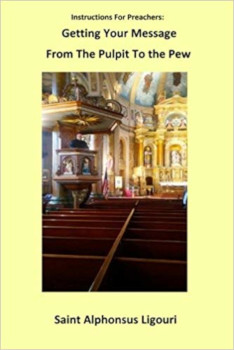
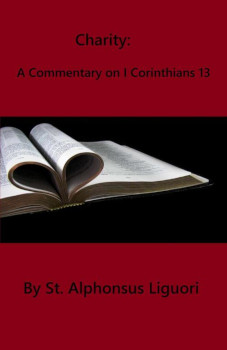








 Follow
Follow


